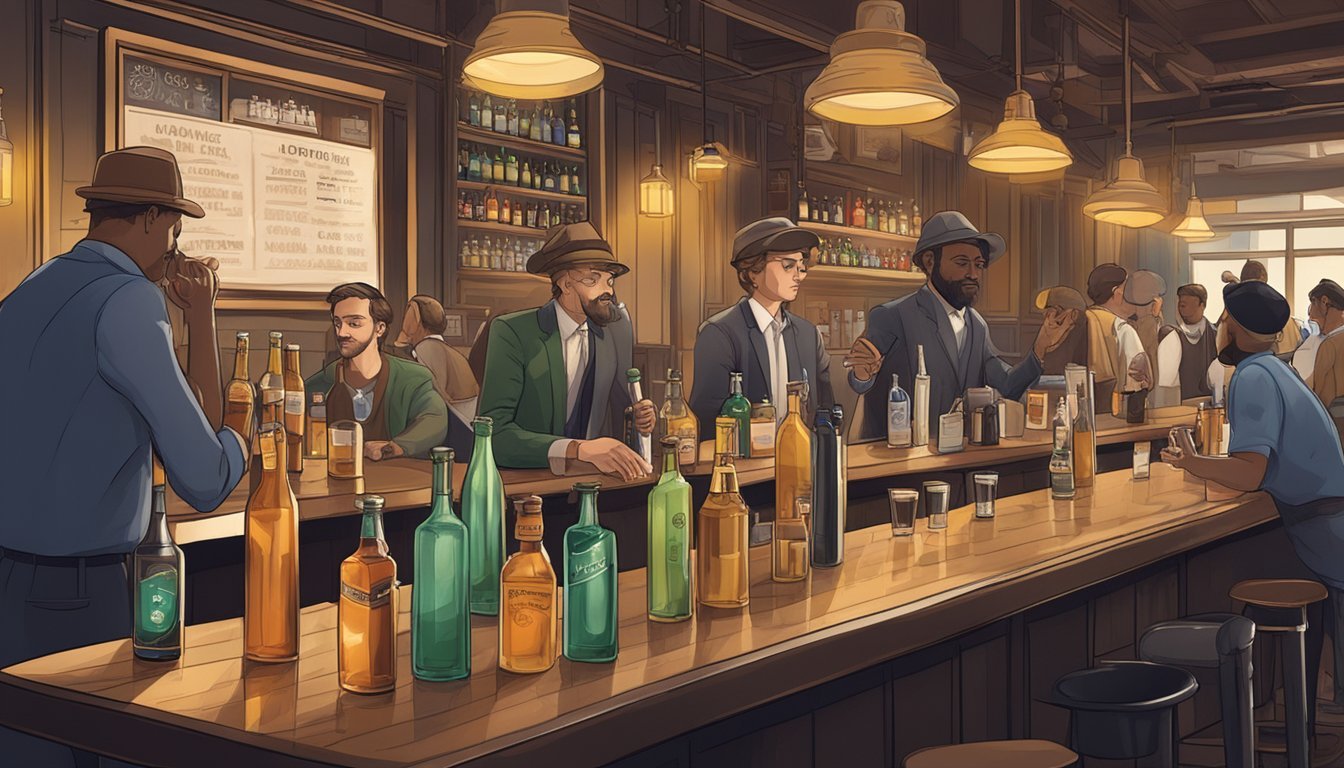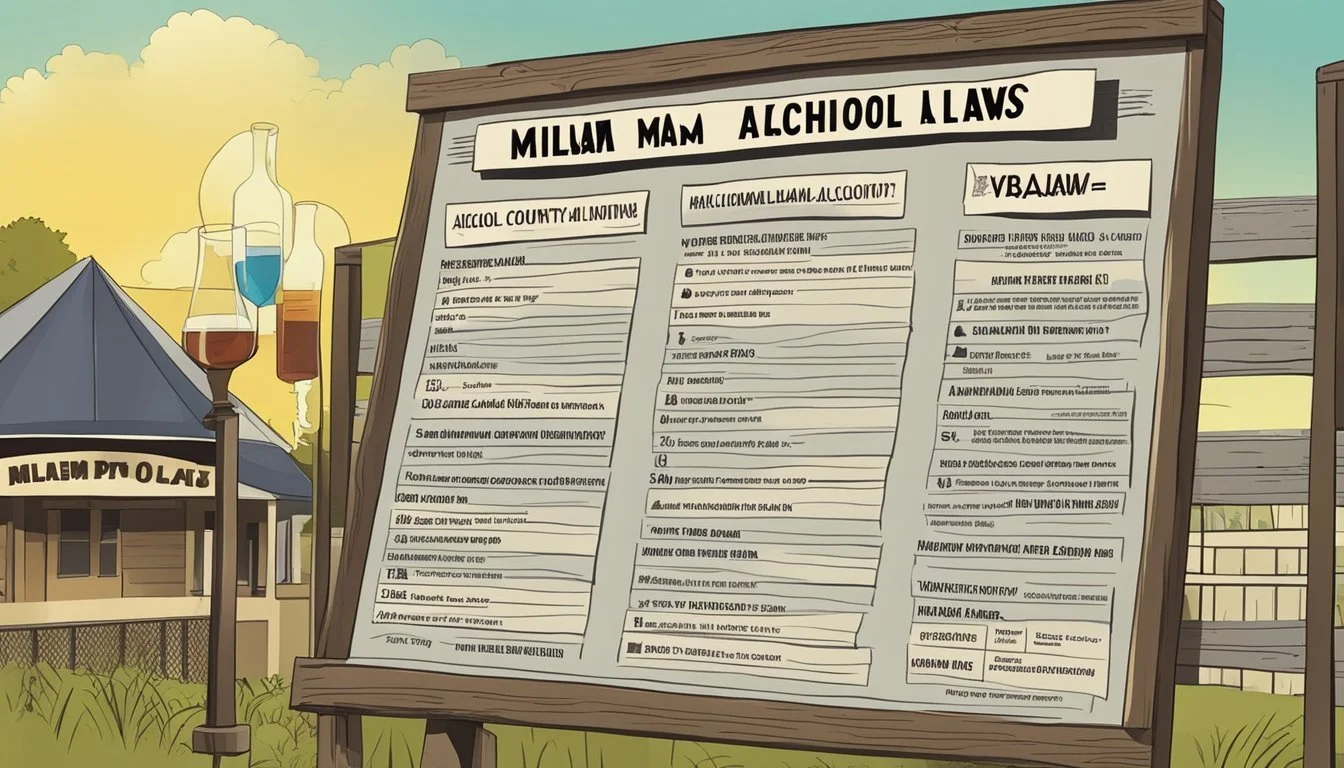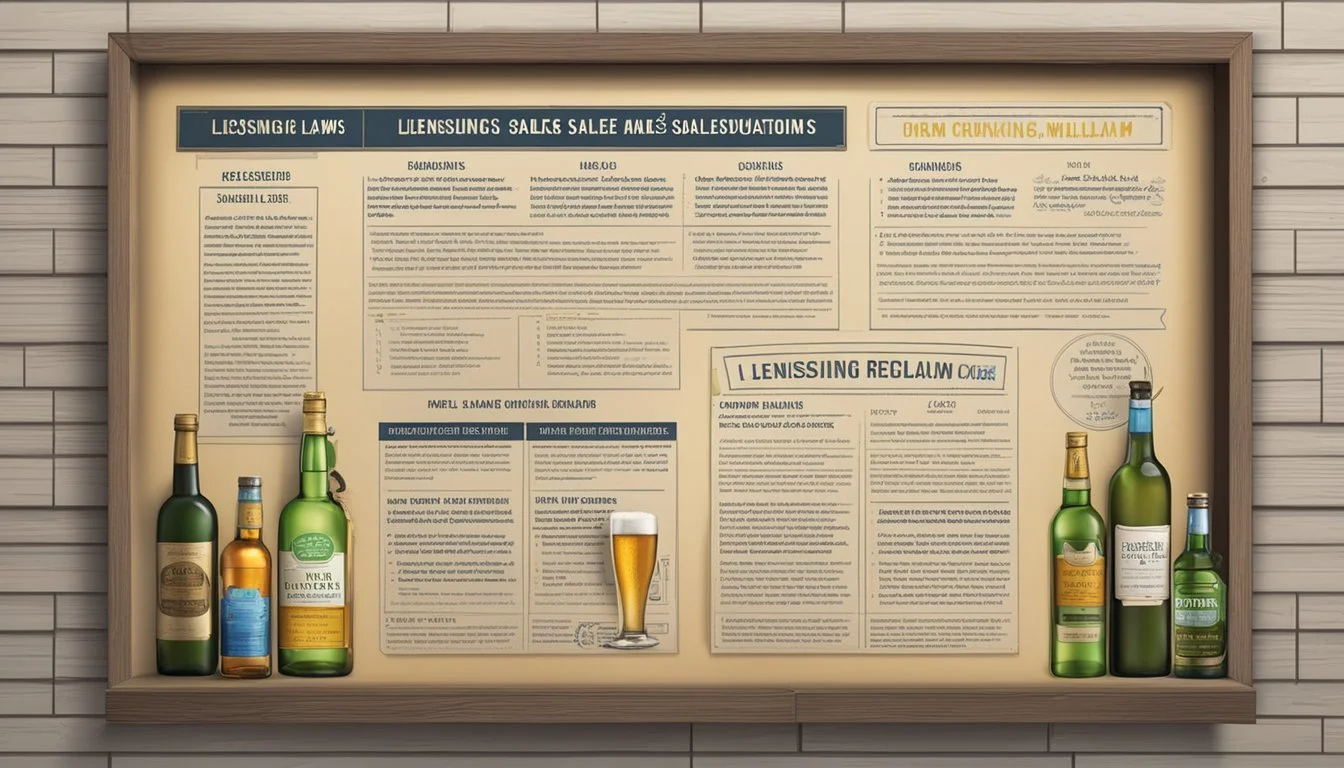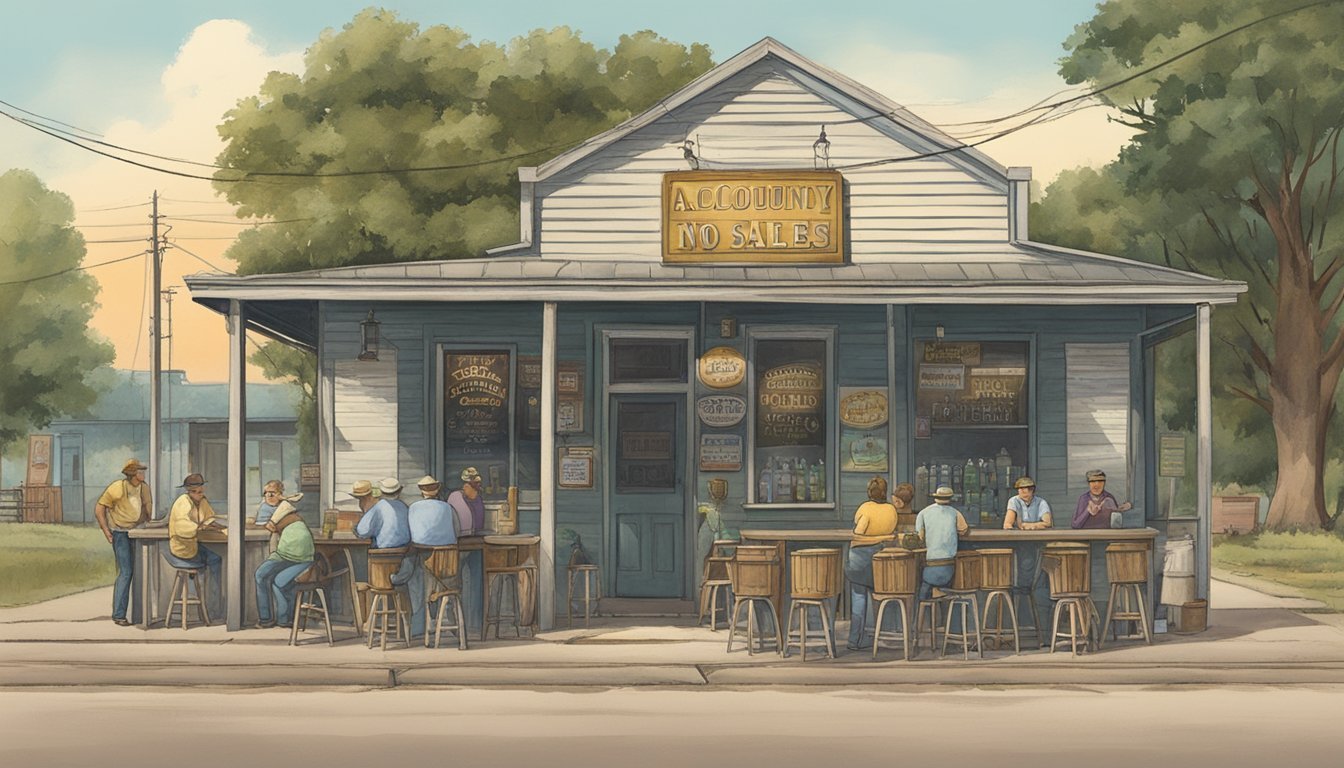Alcohol and Drinking Laws in Milam County, Texas
An Overview
Milam County, Texas, adheres to the state's established alcohol and drinking regulations while also implementing its localized directives. In Texas, where the legal drinking age is 21, alcohol laws are particularly stringent, covering various facets such as sales hours, DUI enforcement, age verification, and county-specific dry laws. Milam County's rules exemplify the state's dedication to manage the sale and consumption of alcohol within its jurisdiction, reflecting the community's standards and values.
In unincorporated areas of Milam County, the sale of packaged liquor is forbidden on Sundays. When permitted, packaged liquor may be sold from 10:00 a.m. to 9:00 p.m., Monday through Saturday. Conversely, the sale of beer and wine is slightly more lenient, allowing transactions from noon to midnight on Sunday and extending hours during the remainder of the week. These time restrictions are a testament to Texas's commitment to regulate alcohol consumption responsibly.
While state laws set a uniform framework, specific regulations can vary by city and county, emphasizing local governments' authority to tailor alcohol laws to their constituencies. This localized approach ensures that Milam County's alcohol laws align with both state mandates and the unique demands of its local populace. Through these measures, Texas and Milam County aim to balance personal freedom with public safety and community welfare.
Overview of Milam County Alcohol Laws
In Milam County, Texas, the Texas Alcoholic Beverage Commission (TABC) sets and enforces state-wide regulations, while local alcohol laws can vary within jurisdictions. State law governs the sale of alcoholic beverages and the applicable hours during which they can be sold.
The sale of packaged liquor is not permitted on Sundays. During the rest of the week, packaged liquor may be sold from:
Monday to Saturday: 10:00 a.m. to 9:00 p.m.
However, packaged beer and wine have more flexible sale hours. They are allowed to be sold during the following times:
Sunday: noon to midnight
Monday to Friday: 7:00 a.m. to midnight
Saturday: 7:00 a.m. to 1:00 a.m.
These regulations are particularly relevant for unincorporated areas of the county. It is important for both businesses and consumers to be aware of these time constraints to comply with local laws.
For businesses looking to retail alcoholic beverages, the purchasing and sale must align with the laws set up by the TABC. Violations of these laws can lead to administrative hearings and the imposition of penalties. The TABC also provides legislative updates which are crucial for businesses to stay informed on the latest changes to alcohol-related regulations.
Milam County takes these regulations seriously, and local law enforcement is vigilant in ensuring that alcohol sales adhere to the stipulated hours and rules. Businesses and individuals are advised to acquaint themselves with these laws to avoid legal complications.
Licensing and Sales Regulations
In Milam County, Texas, the sale of alcoholic beverages is regulated by state law, with specific licensing requirements for different types of establishments. Businesses must comply with these laws to operate within the county, whether it's a local liquor store, a dining venue serving alcohol, a grocery selling beer and wine, or a hotel bar catering to guests.
Liquor Store Operations
Liquor stores in Milam County must obtain a Package Store Permit (P) from the Texas Alcoholic Beverage Commission (TABC). This permit allows for the retail sale of liquor for off-premises consumption. The operations are subject to TABC’s code, which dictates store hours and age verification requirements. Additionally, Walmart or any other publicly traded corporation is forbidden by state law to own or operate package stores.
Restaurant and Bar Licensing
Restaurants and bars are required to apply for specific permits based on the type of alcoholic beverages they intend to sell. To serve mixed drinks, a Mixed Beverage Permit (MB) is necessary, while a Beer and Wine Permit (BG) suffices for establishments only serving beer and wine. They must ensure that the sale of alcoholic beverages complies with state-mandated hours of operation and responsible service regulations.
Retail Sales by Grocery and Gas Stations
Grocery and gas stations in Milam County are permitted to sell beer and wine for off-premises consumption. Such establishments must secure either a Beer Retail Dealer's On-Premise License (BE) or a Wine-Only Package Store Permit (Q). They are also responsible for adhering to state laws regarding the sale to minors and specific hours during which alcoholic beverages may be sold.
Special Provisions for Hotel Bars
Hotel bars obtain a Mixed Beverage Permit (MB) and can also apply for a Mixed Beverage Late Hours Permit (LB) if they wish to extend their hours of alcohol service. Milam County recognizes that these venues often cater to travelers and may have different operational needs than typical bars or restaurants.
The licensing process in Milam County, as is across Texas, is thorough, ensuring that businesses stay compliant with state regulations and maintain a safe environment for the purchase and consumption of alcoholic beverages.
Time Restrictions and Blue Laws
Time restrictions on alcohol sales and the vestiges of "blue laws" influence when alcohol can be purchased in Milam County, Texas. These laws are a blend of historical religious customs and modern legislative updates.
Sunday Sales
In Milam County, as per Texas state law, Sunday alcohol sales are subject to specific time restrictions. Retailers selling beer and wine can start sales at 10 a.m. on Sundays due to House Bill (HB) 1518, which amended previous laws. Liquor stores, however, remain closed on Sundays as mandated by state legislation.
Saturday: Sale of alcohol is permitted until midnight.
Sunday:
Beer and Wine: Available from 10 a.m.
Liquor: No sales.
Holiday Restrictions
Alcohol sales are further restricted on certain holidays. Retailers must adhere to the prohibition of liquor sales on major holidays, specifically:
New Year's Day
Thanksgiving Day
Christmas Day
During these holidays, selling liquor is prohibited, contributing to the planning considerations for residents and visitors of Milam County.
Liquor Stores: Closed on the above holidays.
Beer and Wine Retailers: Sales restrictions align with the state-provided guidelines for these days.
Legal Drinking Age and Underage Drinking
In Milam County, Texas, as in the rest of the state, the legal drinking age is 21 years old. This aligns with federal mandates that penalize states with reduced federal highway funds if they do not maintain a minimum drinking age of 21. The establishment of this age limit has been associated with a decline in motor vehicle crashes and underage drinking rates nationally.
Despite the clear legal boundary, underage drinking persists. Texas law includes specific provisions that aim to deter this practice:
Zero Tolerance Law: Individuals under 21 caught driving with any detectable amount of alcohol may face penalties including license suspension.
Possession and Consumption: It's illegal for those under 21 to buy, attempt to buy, possess, or consume alcoholic beverages in Texas.
Texas does offer some exceptions to these rules, including consumption under parental supervision, for religious ceremonies, or in the context of employment.
Underage drinking statistics underscore the importance of these laws. While national trends show a decrease in underage drinking, it remains a concern. In recent years, there was a reported 19.7% of youths aged 14 to 15 having consumed alcohol.
Age Group Percentage
14-15 19.7%
12-20 N/A
Texans take the issue of underage drinking seriously, employing various legal strategies to prevent and reduce it. These laws reflect a commitment to safeguarding youth and the wider community from the risks associated with underage alcohol consumption.
Driving Under the Influence and Related Offenses
Milam County, Texas, adheres to strict regulations regarding driving under the influence (DUI) and driving while intoxicated (DWI), including various penalties for offenders and specific laws concerning open containers in vehicles. It is crucial for drivers to understand these laws to avoid legal repercussions.
DWI and DUI Laws
In Texas, the term "DWI" is commonly used over "DUI" to describe the act of operating a motor vehicle while impaired by alcohol or drugs. First-time offenders are typically charged with a Class B misdemeanor, which may include a fine, jail time, or both. Being charged with a DWI indicates that either the driver has a blood alcohol concentration (BAC) of 0.08 percent or higher, or that they have lost the normal use of their mental or physical faculties due to alcohol or drug consumption.
Repeat offenders face harsher consequences. A second DWI offense is still considered a misdemeanor but with increased penalties, including a higher fine and longer jail time. A third offense escalates the charge to a felony with even severer penalties, including the potential for significant jail time.
Open Container Laws
Texas law prohibits the possession of an open container of alcohol in the passenger area of a vehicle. An "open container" refers to any bottle, can, or other receptacle containing any amount of alcoholic beverage that is open or has a broken seal. It is a Class C misdemeanor to violate this law; however, there is an exception if the open container is in the locked glove compartment or trunk.
Penalties for Violations
Penalties for DWI and related offenses in Texas are determined by the number of prior offenses and the severity of the current offense. They may include:
Fines: For a first DWI, fines can be up to $2,000. Repeat offenses can see fines increase substantially, with a third DWI potentially incurring up to $10,000.
Jail Time: A first DWI charge may result in a jail sentence ranging from a few days to several months. Repeat offenders can expect longer sentences, with the possibility of years in prison for felony DWI convictions.
Mandatory Programs: Some offenders may be required to participate in alcohol assessment and treatment programs.
Regardless of the specific circumstances, Texas laws emphasize the seriousness of these offenses and aim to deter individuals from jeopardizing public safety by drinking and driving.
Enforcement and Legal Consequences
In Milam County, Texas, the enforcement of alcohol laws and the resulting legal consequences for violations are strictly upheld. They are designed to ensure public safety and to discourage illegal activities related to alcoholic beverages.
County and City Regulations
Milam County follows Texas state law for alcohol regulation, but specific enforcement can vary at the county and city levels, including in places like Cameron. Violations of these laws can result in significant legal consequences. For instance, a Class C misdemeanor can be issued for public intoxication, carrying a fine of up to $500. Additionally, local ordinances in cities within Milam County further dictate the specifics of alcohol law enforcement.
Community Service and Rehabilitation Programs
Individuals found violating alcohol laws in Milam County may be mandated to participate in community service and rehabilitation programs. These programs are aimed at educating offenders on the dangers of alcohol misuse and promoting community welfare. Here's an overview:
Community Service: 8 to 40 hours for minor offenses related to alcohol.
Rehabilitation Programs: Attendance of an alcohol awareness class may be ordered.
These consequences are part of the county's commitment to maintain public health and safety while providing avenues for offenders to learn from their mistakes.
Dry Counties and Local Variations
In Texas, counties operate under the alcoholic beverage code, which allows them to individually determine their wet or dry status. Milam County aligns with local regulations that permit the sale of alcoholic beverages, thus it is not designated as a dry county.
Dry Counties: Historically, several counties in Texas have maintained a status forbidding the sale of alcohol. As of 2021, Texas had only five completely dry counties. Over the years, there's been a steady decrease in the number of dry counties due to changes in local sentiments and elections altering regulations.
Table: Wet vs. Dry Status Over Time in Texas (Sample Data)
Year Wet Counties Dry Counties
1986 N/A 62
1995 N/A 53
2003 35 51
2021 59 5
Counties have the autonomy to facilitate local option elections to decide the types of alcoholic beverages sold and the venues where they can be sold. This may result in a county being partially wet or dry, depending on the precincts' decisions.
Milam County's approach to the sale of alcohol showcases the localized nature of Texas alcohol regulations. While the county authorizes the sale of alcoholic beverages, it operates under the standards and legalities laid down by the Texas Alcoholic Beverage Code, ensuring all sales are within the law.
Public Intoxication and Consumption Laws
In Milam County, Texas, public intoxication is governed by the Texas Penal Code § 49.02. Individuals are prohibited from appearing in a public place while intoxicated to the degree that they may pose a danger to themselves or others. Public intoxication is a Class C misdemeanor, punishable by a fine.
Key Points of Public Intoxication Law in Milam County:
Age: Adults 21 and over face public intoxication charges.
Fine: Up to $500 for public intoxication offenses.
Premises: Involves any public place, including premises licensed for alcohol sales.
Individuals under 21 may face additional penalties, such as:
Driver's License: Suspension up to 30 days.
Educational Requirement: Mandatory attendance in an alcohol awareness class.
When it comes to alcohol consumption, Milam County adheres to statewide policies, which may vary by local jurisdiction. The sale of alcohol is regulated, and businesses must adhere to licensing laws for permissible service hours and days. Driving while intoxicated (Sec. 49.04) is a serious offense, and if a person operates a motor vehicle in a public place while intoxicated, it is a Class B misdemeanor, with a minimum term of confinement of 72 hours.
The overarching goal of such laws is to protect public health and safety by discouraging excessive and irresponsible alcohol consumption, especially in public settings. These laws reflect a societal consensus on the importance of maintaining order and safety in communal spaces.
Impact of Alcohol Laws on Local Businesses
In Milam County, Texas, local businesses must navigate a complex framework of alcohol laws. The Texas Alcoholic Beverage Code dictates the operating procedures for establishments selling or serving alcohol. Adhering to these regulations is crucial for businesses to maintain their licenses and continue operations.
Retailers' Adjustments:
Understanding varying permissions and hours of sale as mandated by local and state law.
Adjusting inventory and staffing according to the legal requirements for sales on different days.
For Restaurants and Bars:
Incorporating food and alcohol sales in a balanced manner to comply with licensing that often stipulates ratios of food to alcoholic beverage sales.
Remaining vigilant about not serving minors, which requires staff training and constant oversight.
Economic Implications:
Compliance with the Alcohol Beverage Code potentially increases operational costs due to administrative burdens.
Conversely, businesses selling alcohol often experience increased revenue due to consumer demand for alcoholic beverages in the Lone Star State.
For Temporary Events:
Potential benefits from temporary events’ guidelines allowing for short-term sales opportunities, which can boost revenue and community engagement.
License Renewal and Management: Businesses must stay current with changes in the Alcohol Beverage Code and the fee structures involved, which can affect their bottom line. The Texas Alcoholic Beverage Commission’s (TABC) consolidation of licenses and introduction of the Alcohol Industry Management System (AIMS) has streamlined processes for some, yet requires familiarization and adaptation on the part of business owners.
In summary, Milam County businesses are directly influenced by local and state alcohol laws, shaping not just their operations but their financial outcomes as well.










